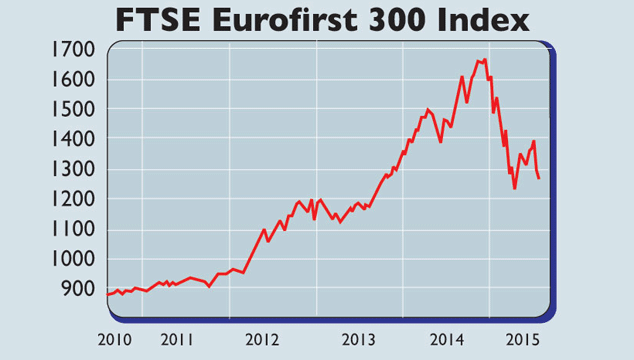Stick with European stocks
With Grexit averted for now, European stocks have bounced back from their recent slump.

Get the latest financial news, insights and expert analysis from our award-winning MoneyWeek team, to help you understand what really matters when it comes to your finances.
You are now subscribed
Your newsletter sign-up was successful
Want to add more newsletters?

Twice daily
MoneyWeek
Get the latest financial news, insights and expert analysis from our award-winning MoneyWeek team, to help you understand what really matters when it comes to your finances.

Four times a week
Look After My Bills
Sign up to our free money-saving newsletter, filled with the latest news and expert advice to help you find the best tips and deals for managing your bills. Start saving today!

With Grexit averted for now, European stocks have bounced back from their recent slump. But the upswing should have further to go. The economic backdrop, monetary policy, and valuations all point to further gains. For starters, the economic recovery, while unspectacular, remains intact. GDP growth could reach 1.5% in 2015, says Ernst & Young. The European Commission's Economic Sentiment Indicator, a widely watched composite snapshotof the euro area, has reached afour-year high. Unemployment is ata three-year low.
Wages grew by 2.2% in the first quarter and retail sales have climbed steadily. Core inflation, which strips out volatile food and energy prices, has risen to 1%, the highest since April 2014. That has allayed fears of a fall into deflation and a Japan-style slump. But perhaps the most encouraging data point, as Bank of America Merrill Lynch (BAML) points out, is the apparent thaw in the credit cycle after a multi-year freeze. In May, lending to non-financial corporations turned positive for the first time in three years, and the pace accelerated in June.
This bodes well for profit growth, not least because "European companies have cut themselves to the bone" in recent years, says John Authers in the FT. With costs much lower, more sales should drop through to the bottom line. Meanwhile, European profits also depend partly on global growth, as continental firms make many of their sales overseas. As the US recovery strengthens, the global expansion should get faster, reckons Barclays. Europe ex-UK earnings-per-share could rise by almost 9% in 2015, compared to 1.6% profit growth in America.
MoneyWeek
Subscribe to MoneyWeek today and get your first six magazine issues absolutely FREE

Sign up to Money Morning
Don't miss the latest investment and personal finances news, market analysis, plus money-saving tips with our free twice-daily newsletter
Don't miss the latest investment and personal finances news, market analysis, plus money-saving tips with our free twice-daily newsletter
A further tailwind comes from the European Central Bank's quantitative easing (QE) programme. It is printing €60bn a month in order to ward off deflation and bolster growth. Post-crisis money printing programmes in the US and UK have shown that QE has little impact on growth, but a big effect on asset markets, as fresh liquidity tends to end up there. "We know what happens to stocks under QE," says Authers. "They go up."
Meanwhile, Europe looks cheap. Italy and Spain are trading on cyclically adjusted price-earnings ratios of under 13. Developed European markets are 25% cheaper than developed markets as a whole. And BAML's latest fund manager survey shows that institutional investors intend to stock up on European stocks. The eurozone remains a buy.
Get the latest financial news, insights and expert analysis from our award-winning MoneyWeek team, to help you understand what really matters when it comes to your finances.

-
 Should you buy an active ETF?
Should you buy an active ETF?ETFs are often mischaracterised as passive products, but they can be a convenient way to add active management to your portfolio
-
 Power up your pension before 5 April – easy ways to save before the tax year end
Power up your pension before 5 April – easy ways to save before the tax year endWith the end of the tax year looming, pension savers currently have a window to review and maximise what’s going into their retirement funds – we look at how